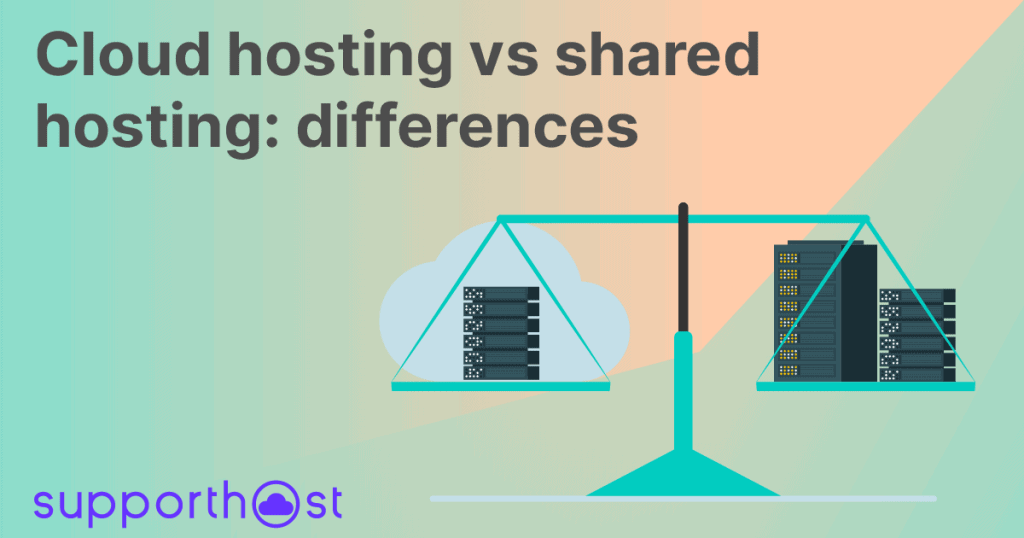In this article,Cloud hosting vs Shared hosting: the differences we will compare the two different hosting solutions: VPS cloud hosting and shared hosting.
This head-to-head “cloud vs shared” hosting will make us understand what these two options can offer us and when to rely on one solution rather than the other.
Let’s start by looking at what these two services offer and then focus on the differences in terms of resources, performance, security and manageability.
If, on the other hand, you want to delve into what cloud services offer in general check out our article on Cloud: what it is and how does it work?.
Table of Contents
What is shared hosting?
A shared hosting is based on a shared infrastructure, as you can easily guess from the name itself. But what is shared hosting? In a shared hosting, one server hosts multiple sites of different users.
This means that the disk space, CPU and RAM of the machine are available to multiple users. Each site, therefore, draws on the resources and of course there are limitations to be respected depending on the plan you choose.
We could define shared hosting as the entry level solution which then sees its logical continuation in semi-dedicated hosting and dedicated solutions.
Semi-dedicated hosting is still shared, this means that even in this case the server resources are shared among multiple users.
In this case, however, the number of accounts on the server is limited compared to shared hosting. This is exactly why a semi-dedicated plan allows you to access more resources.
This is why it is adapted, therefore, to sites with a higher volume of traffic than those that can easily have excellent performance in shared hosting. Instead, let’s see what is meant by cloud hosting.
What is cloud hosting?
Cloud hosting or VPS cloud hosting solutions provides you with a virtual server. Leaning on a single server, or much more often, a cluster of servers, several virtual machines are created.
Each virtual machine is separate from the others and is designed to function as if it were a dedicated, physical server.
At the same level of customization possibilities offered by a dedicated server, cloud hosting grants you other advantages as well.
For example, it is possible to increase resources more easily, precisely because it is not necessary to move data from one physical server to another. A step which, instead, is necessary when you want to upgrade to a dedicated server.
Compared to a traditional VPS, furthermore, since it is a plan that relies on a cloud infrastructure, it guarantees hardware redundancy.
This means that should there be a problem with one server, the resources of another server in the cluster are used immediately. As a result, site downtime is minimized and uptime is always guaranteed.
Cloud vs shared: performance differences
Now that we’ve seen what shared hosting and cloud hosting services can offer us, let’s immediately start comparing them beginning with the performance they guarantee.

Often we are led to think that the comparison cloud vs shared is clearly in favor of the cloud, especially with regard to performance.
If we go to compare professional services, we immediately realize that this is not the case and that their performance is more similar than you might think.
Hardware
When we refer to plans offered by the same provider, it doesn’t make sense to talk about hardware differences.
Cloud plans in the same way as shared and semi-dedicated hosting plans all rely on the same datacenter.
The servers on which all our plans are hosted use SSD disks and guarantee 1Gbps connectivity. You can learn read more about the differences between SSD hosting and traditional hosting in our article.
Moreover, thanks to the use of redundant connections, fast access is ensured to all the sites hosted on our servers.

We’ve chosen to offer the highest performance to ensure flawless service no matter which plan you choose.
Knowing that on the hardware side there are no differences between cloud and shared hosting means you’re guaranteed comparable performance. The differences, as we will see later, depend instead, albeit to a lesser extent, on software optimization.
Site optimization
We often hear that cloud hosting is faster than shared hosting.
The choice of high-performance hosting is the base for a fast website but it is not the only determining factor.
Two different sites hosted on the same server, with the same resources available will vary in speed. This happens because the speed of a site also depends on the site itself.
Among the factors that greatly affect the loading speed are the size of the pages and the number of requests.
To give a practical example, a site with a 6MB page and 200 requests is a heavy site. The time required to load a page of this size will be high, regardless of the hosting plan chosen.

A large number of plugins on the site requires the server to perform queries and calculations that will affect the page load time. The workload on the server, both for shared and cloud plans, is irrelevant when we refer to a single page load.
Consider that the impact depends not so much on the number of plugins, but on which ones are used. To understand the real impact of plugins on performance check our article on plugins that slow down WordPress.
The matter becomes more complex when the number of visits to the site increases significantly. In this case, in fact, the difference between cloud vs shared hosting becomes evident.
Cloud vs shared: customization possibilities
A cloud hosting plan can fully adapt to your needs. This means that optimization can be done to achieve improvements for your specific case.
For example, your site might get better performance using a server-side caching system like Varnish, while another customer’s site might need to use Engintron.
These specific optimizations are possible in cloud hosting, as it is a dedicated solution.
On the other hand, in shared hosting, it is not possible to adopt the best solution for each individual site. What you can do is to use the system that is optimal for all sites hosted on the same server.
In any case, however, although the adoption of systems of this nature specifically tailored to the site, can improve performance, roughly 10 – 20%. We must not overlook the importance of site optimization, as we have seen before.
Cloud vs shared: resources of hosting plans
The resources actually available to your site don’t just depend on the type of web hosting you’ve chosen to rely on.
This means that comparing a shared hosting plan with 4 GB of RAM to a VPS cloud hosting with 4 GB of RAM you might have the same performance or find differences.
What does it depend on? It depends on the provider and how much overselling they have decided to do.
You have to consider, in fact, that in terms of resources there can also be a substantial difference comparing cloud vs shared hosting.
Let’s start with shared hosting and how resources are managed.
Starting from the assumption that unlimited hosting doesn’t exist, when the plan specifies a limit we usually talk about the maximum limits. What does this mean?
Shared plans by their nature cannot guarantee dedicated resources. The hosting resource limits that are indicated in the plans serve to provide an indication and a maximum limit.
It is precisely on these assumptions and based on the assumption that each account uses a fraction of the resources provided by its plan, that overselling can be managed by selling services that actually exceed the actual availability.
If we shift, instead, to a VPS cloud hosting service the situation changes. In this case, the resources provided by the plan are dedicated and really available for your site. In practice, even if you are not using them at a given time, those resources are intended for you.
Between cloud vs shared hosting, there is also a basic difference. Cloud plans basically offer more resources to ensure maximum performance and support more traffic. This is also why the cost of cloud hosting is higher than that of a shared plan.
In conclusion, if we compare two plans, one shared and one cloud, with equal resources you won’t notice any difference in our case.
Why and when should you choose to switch to a cloud hosting solution then?
Mainly there are two major reasons that may require you to choose a cloud plan instead of shared hosting.
The first is the need to use specific software to meet particular needs. As we mentioned one of the main advantages of the cloud is precisely the ability to customize it to your needs. For example, cloud plans are ideal for creating a Minecraft server.
The second one, instead, is when your site records large volumes of visits. In this case, when the resources of shared hosting are no longer sufficient and the demands of your site grow, it’s time to lean on a dedicated solution.
It’s no coincidence that the number of visits is one of the factors you need to take into account when it comes to choosing a hosting that best suits your needs.
Cloud vs. shared: security
Shared hosting often has a reputation for being insecure. You may have already heard about the vulnerability of sites hosted on shared hosting.
The idea is that on a shared server, an attack from a hacker on one account can easily extend to other accounts hosted on the same server. This can only happen if security systems are not implemented properly.

In our case to offer a secure hosting service we use CloudLinux which uses CageFS, CageFS allows us to completely isolate every single account from all the others. In this way, even if an account hosted on the same server is attacked, your site will not run any risk of being compromised.
In addition, thanks to CloudLinux all accounts are monitored in real-time, so if an account receives a peak of visits or uses an excessive number of resources it is temporarily blocked to prevent it from causing problems to the whole server.
This prevents a spike in traffic or a problem with a script in one of the accounts from causing service disruption to other clients.
By taking these measures, our shared plans are as secure as the cloud plans.
Cloud vs. shared: necessary skills needed
You might think that from a server management perspective, a shared plan would be easier to manage than a cloud plan. Actually, this is not the case.
Just as with dedicated servers, you don’t necessarily have to have the specific technical knowledge to rely on a VPS cloud hosting.

Just choose a managed cloud plan and you won’t have to deal with server management. You can take care of the site, while our tech support takes care of configuring and managing the server.
Practically in a managed server we can take care of everything, just like in shared hosting.
If, on the other hand, you have the skills to manage the server on your own, just choose an unmanaged plan to have full control of your server and take care of it yourself or delegate the management to a system administrator in your team.
Cloud vs shared: conclusion
In this article, Cloud hosting vs Shared hosting: the differences, we looked at the characteristics of these two hosting services. Our comparison was based on performance, resources, the security they can offer users and the skills needed to use the service.
As we have seen in many ways the two services are quite similar. In professional hosting, where security is the focus, measures are used that can make shared hosting as secure as cloud plans.
Even the performance, contrary to popular belief, is comparable. Obviously, however, the matter changes when your site has special needs or when it has to support large volumes of visits. In these cases, the best solution is to move towards a dedicated plan, so the choice should lean towards the cloud.
Which of these two hosting solutions are you most satisfied with? Let me know in the comments below.


Leave a Reply